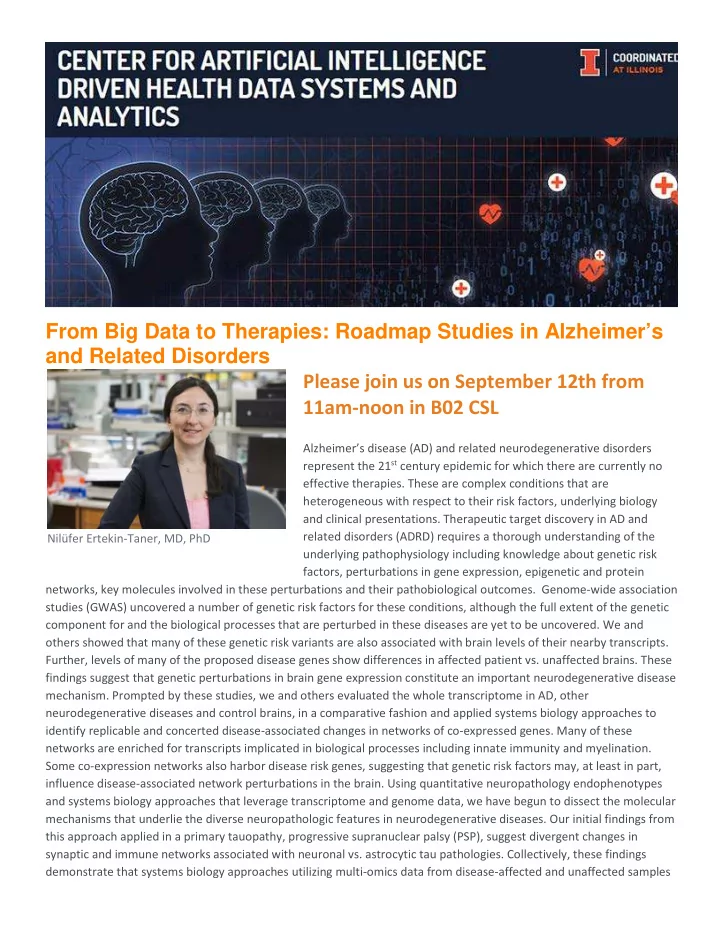

From Big Data to Therapies: Roadmap Studies in Alzheimer’s and Related Disorders Please join us on September 12th from 11am-noon in B02 CSL Alzheimer’s disease (AD) and related neurodegenerative disorders represent the 21 st century epidemic for which there are currently no effective therapies. These are complex conditions that are heterogeneous with respect to their risk factors, underlying biology and clinical presentations. Therapeutic target discovery in AD and related disorders (ADRD) requires a thorough understanding of the Nilüfer Ertekin-Taner, MD, PhD underlying pathophysiology including knowledge about genetic risk factors, perturbations in gene expression, epigenetic and protein networks, key molecules involved in these perturbations and their pathobiological outcomes. Genome-wide association studies (GWAS) uncovered a number of genetic risk factors for these conditions, although the full extent of the genetic component for and the biological processes that are perturbed in these diseases are yet to be uncovered. We and others showed that many of these genetic risk variants are also associated with brain levels of their nearby transcripts. Further, levels of many of the proposed disease genes show differences in affected patient vs. unaffected brains. These findings suggest that genetic perturbations in brain gene expression constitute an important neurodegenerative disease mechanism. Prompted by these studies, we and others evaluated the whole transcriptome in AD, other neurodegenerative diseases and control brains, in a comparative fashion and applied systems biology approaches to identify replicable and concerted disease-associated changes in networks of co-expressed genes. Many of these networks are enriched for transcripts implicated in biological processes including innate immunity and myelination. Some co-expression networks also harbor disease risk genes, suggesting that genetic risk factors may, at least in part, influence disease-associated network perturbations in the brain. Using quantitative neuropathology endophenotypes and systems biology approaches that leverage transcriptome and genome data, we have begun to dissect the molecular mechanisms that underlie the diverse neuropathologic features in neurodegenerative diseases. Our initial findings from this approach applied in a primary tauopathy, progressive supranuclear palsy (PSP), suggest divergent changes in synaptic and immune networks associated with neuronal vs. astrocytic tau pathologies. Collectively, these findings demonstrate that systems biology approaches utilizing multi-omics data from disease-affected and unaffected samples
with deep endophenotypes can enable discovery of novel disease biologic pathways, their key molecules and also inform on potential mechanisms of their influence on various disease outcomes including cell-specific vulnerability. Additional layers of multi-omics data including epigenetics and proteome, assessment of various endophenotypes and investigation of both brain and peripheral networks are expected to provide a more comprehensive picture for the multitude of disease pathways and mechanisms that are instrumental in these complex conditions. Ultimately, these discoveries will pave the way for novel therapies and disease biomarkers that are sorely lacking in AD and related neurodegenerative diseases. Nilüfer Ertekin-Taner, MD, PhD is a Professor of Neurology and Professor of Neuroscience at Mayo Clinic Florida. She is a neurogeneticist and board-certified behavioral neurologist. Dr. Ertekin-Taner received her medical degree from Hacettepe University Medical School in Ankara, Turkey and her doctorate degree in Molecular Neuroscience from Mayo Graduate School. She completed her residency training in the Department of Neurology at Mayo Clinic in Rochester, MN and fellowship in Behavioral Neurology at Mayo Clinic Florida. Dr. Ertekin-Taner’s laboratory aims to discover and characterize genetic factors underlying complex neurodegenerative diseases such as Alzheimer’s disease (AD) and related neurodegenerative conditions. Her earlier work contributed to the establishment of the endophenotype approach in genetic studies of AD and pioneered the use of amyloid β peptide levels as an endophenotype in AD genetic research. Dr. Ertekin-Taner’s laboratory currently uses biological traits including cognition and neuropathology and leverages combined genome, transcriptome and epigenetic data to uncover genetic risk factors and disease pathways for neurodegenerative conditions. Dr. Ertekin-Taner and her team generates large-scale, multi-omics datasets which they broadly share with the research community. Using multi-omics and deep endophenotype data from large cohorts, her team led the discoveries and characterizations of novel pathways and molecules in AD and related conditions. Dr. Ertekin-Taner is the Principal Investigator (PI) of numerous NIH and foundation grants. She leads multiple collaborative projects aimed at gene and pathway discoveries in AD and other neurodegenerative diseases, as part of the NIH initiatives Accelerating Medicines Partnership Alzheimer’s Disease (AMP-AD) and Molecular Mechanisms of the Vascular Etiology of AD (M 2 OVE-AD) consortia. Dr. Ertekin-Taner is the PI of the Florida Consortium for African- American Alzheimer’s Disease Studies (FCA3DS). Dr. Ertekin-Taner has led and continues to lead large, multi-site projects that leverage complex -omics data along with phenotypes from post-mortem and ante-mortem series with an overarching goal of uncovering the genetic underpinnings of AD and other neurodegenerative conditions to ultimately identify therapeutic targets and biomarkers. As a physician-scientist, Dr. Ertekin-Taner also continues to manage patients with AD and other neurodegenerative diseases. Lab Webpage: https://www.mayo.edu/research/labs/genetics-of-alzheimers-disease-and-endophenotypes Dr. Ertekin-Taner Mayo Clinic Bio: https://www.mayo.edu/research/faculty/taner-nilufer-m-d-ph-d/bio-00027318 LinkedIn: https://www.linkedin.com/in/nilufer-ertekin-taner-30037b152/ Related websites: https://www.nih.gov/news-events/news-releases/decoding-molecular-ties-between-vascular- disease-alzheimers https://www.nia.nih.gov/research/dn/amp-ad-target-discovery-and-preclinical-validation-project FutureMedicine_BigDataInterview
Recommend
More recommend